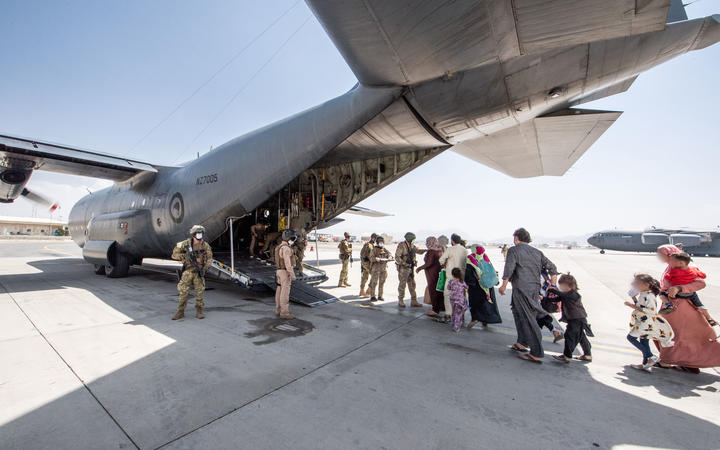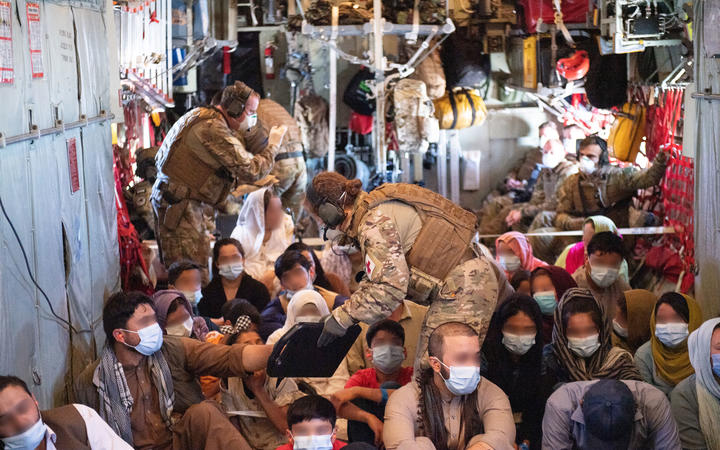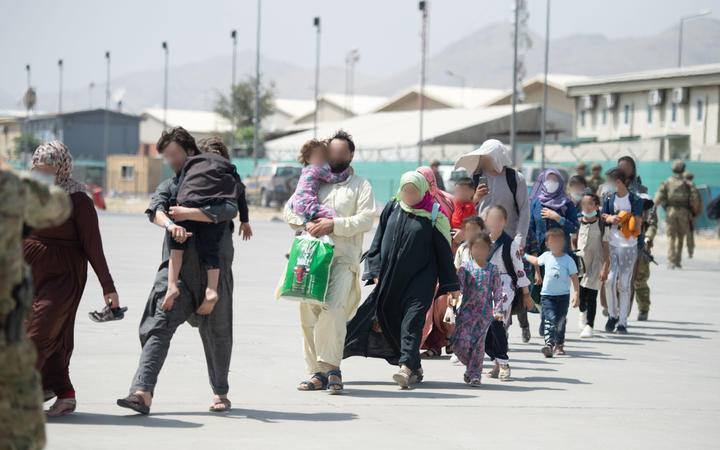Afghan people living in this country are calling for extensive support for people being evacuated out of Kabul once they arrive in New Zealand.

People form a line to board an RNZAF C130 in Kabul. Photo: Supplied / New Zealand Defence Force
Time is quickly running out as the Taliban are insisting all foreign forces must be out of the country by Tuesday.
The New Zealand Defence Force have 19 personnel on the ground at Kabul's Hamid Karzai International Airport and a C-130 Hercules operating from a Middle East base.
Two groups of people with New Zealand connections have so far be taken out of the country.
For security and safety reasons the actual number of evacuees is not being released.
The Ministry for Foreign Affairs and Trade said it was aware of a large number of New Zealanders, their families and other visa holders in Afghanistan who were eligible to enter New Zealand and it was providing support to many of them.
It said its ability to assist individuals on the ground was very limited.
NZDF Commander Joint Forces Rear Admiral Jim Gilmour said the situation on the ground remained extremely challenging and it had been distressing to see the chaotic scenes outside the airport and the desperation of some of those wanting to leave Afghanistan.
Officials have been working hard to get information out to those New Zealanders and eligible nationals seeking to evacuate, he said.

People being evacuated from Afghanistan on board a NZDF plane. Photo: Supplied / New Zealand Defence Force
Diamond Kazimi, a former interpreter for NZDF in Afghanistan who now lives in Aotearoa, said time was quickly running out for those wanting to get out of Kabul.
READ MORE
- Afghanistan: Jacinda Ardern promises 'future evacuation' but warns it will 'look different' as allies withdraw
- Our 'pathetic' contribution to helping the world's refugees
- New Zealand Afghanistan evacuation mission ends after Kabul terror attack
- Jacinda Ardern condemns 'despicable attack' in Kabul as final Defence Force evacuee flight lands safely in UAE
He believed about 200 people linked with New Zealand still needed to be evacuated.
''We've only got a couple of more days, so I have got this doubt that we won't be able to get everyone out, which again will be real tough and they will be facing consequences for being associated with the New Zealand government agencies. Yeah, it will be really tough for them.''
New Zealand's response has been too little too late, Kazimi said.
''Neighbouring nations like Australia, US, the United Kingdom and Canada are bringing thousands (out) and they have already done that, they have already reached 5-6000 people that they have managed to evacuate. We have only been able to evacuate about 50-60 people.''
Kazimi said New Zealand government agencies had ample time - since from about 2013 - to repatriate those who had Kiwi connections.
The Afghan community here said it was vital evacuees were given extensive support once they arrived and went into MIQ.
Afghan Association secretary Khairullah Azizi said the evacuees would be traumatised, and as some could not speak English, they would need a lot of help.
Being in MIQ would add to the stress, he said.
''They have been through a lot and these are scenes and things that New Zealanders in general are not going to have seen and can't really relate to."
His wife was still in Kabul, but had made contact with NZDF personnel on the ground and she was likely to get out.
''She's attempted four times to get here and every time it's got worse and worse, so it's an accumulation of all those vents that she is going to think about and on top of that she is also going to think about the fact that her family is left alone there. She is the only one left from her family.''
Azizi said family members in New Zealand should be able to go into MIQ with the evacuees.
''As soon as they touch down and have to go down to MIQ and spend two weeks alone with no support and after having gone through everything they have gone through back in Afghanistan, it is going to be a bit difficult and so we were thinking about whether or not the government would allow for, for example someone like me who has got a wife who is coming through, whether or not I would be able to spend the time with her, those two weeks.
''I wasn't just going to get a free ride, I am willing to pay for that as well.''
Kazimi said it was important that once they left MIQ, a support network was placed around them.
''It would be better if they spend a couple of weeks in the Māngere Refugee Centre so that they can go through the whole orientation process, making sure they understand the education system, employment, health, everything and I believe that there is a programme in place, but I am just not sure whether these individuals would be receiving those services."

People prepare to board the RNZAF C-130 Hercules in Kabul. Photo: Supplied / New Zealand Defence Force
Immigration New Zealand (INZ) acting deputy head Stephen Vaughan said it was working closely with MIQ and would be providing resettlement support.
INZ was working to, where possible, have all of those from Afghanistan in the same MIQ facility, provide a welcome pack in their own language - along with a phone to call family, and have vaccinated intepreters available, he said.
In addition INZ had been working hard to facilitate visas for those Afghan nationals who met the criteria to be part of the rescue mission and to help screen these individuals prior to them arriving in New Zealand.
''To ensure these individuals can enter New Zealand despite the current border restrictions, the Minister of Immigration has agreed to changes to New Zealand's border entry immigration instructions to allow entry for these individuals.
"This means that individuals who were in Afghanistan on 15 August 2021 and hold a valid temporary or resident visa are exempt from the border restrictions and may enter New Zealand.''
The Refugee Quota Programme within INZ will assign settlement case officers to each family and will carry out daily checks and provide support and information as required.
''All individuals arriving in New Zealand for the first time will be provided with the standard settlement support that refugees arriving under the annual quota would receive and would be able to participate in parts of the reception programme centred on working and living in New Zealand, as well as English language classes.
''Ongoing support will continue to be provided for these families as they move into the community in the same way it would for any quota refugees.''
Joint Head of MIQ Megan Main said the returnees had the same rights as other managed isolation facility occupants.
''While the majority of returnees so far are in family groups, any of them can raise an exemption request to enable a family member to join them in managed isolation. This process would be supported by facility staff, and by the Refugee and Migrant Services team.''




